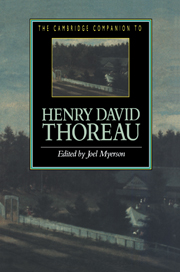Book contents
- Frontmatter
- 1 Thoreau’s reputation
- 2 Thoreau and Concord
- 3 Thoreau and Emerson
- 4 A Week on the Concord and Merrimack Rivers
- 5 Thoreau as poet
- 6 Thoreau and his audience
- 7 Walden
- 8 Thoreau in his Journal
- 9 The Maine Woods
- 10 A wild, rank place
- 11 Thoreau’s later natural history writings
- 12 Thoreau and the natural environment
- 13 Thoreau and reform
- Further reading
- Index
- Series List
3 - Thoreau and Emerson
Published online by Cambridge University Press: 28 May 2006
- Frontmatter
- 1 Thoreau’s reputation
- 2 Thoreau and Concord
- 3 Thoreau and Emerson
- 4 A Week on the Concord and Merrimack Rivers
- 5 Thoreau as poet
- 6 Thoreau and his audience
- 7 Walden
- 8 Thoreau in his Journal
- 9 The Maine Woods
- 10 A wild, rank place
- 11 Thoreau’s later natural history writings
- 12 Thoreau and the natural environment
- 13 Thoreau and reform
- Further reading
- Index
- Series List
Summary
When Henry Thoreau began to keep a journal, in October 1837, he almost certainly did so in response to the prompting of Ralph Waldo Emerson: “ 'What are you doing now?' he asked, 'Do you keep a journal?' - So I make my first entry to-day ” (PJ 1:s). Eventually the Journal became the major work of Thoreau’s imaginative life, providing the raw material for his published writings and filling nearly fifty notebooks by the time of his death in May 1862. When Thoreau died, Emerson arranged for the funeral service to be held at Concord’s First Parish Church, and he delivered the eulogy. Emerson expanded his address for the Atlantic Monthly, in August, and reprinted it as the introduction to the volume of Thoreau’s Excursions, which he helped to edit in 1863. Eventually, Emerson’s “Thoreau ” came to stand as the introduction to the twenty-volume Houghton Mifflin “Walden Edition ” (1906) that has been the standard text of Thoreau’s writings for most of the twentieth century.
Thus, Emerson not only called Thoreau into being as a writer but also launched him toward posterity with the first extended account of his life and career. As we shall see, Emerson’s "Thoreau" was hardly the typical laudatory summing-up of a departed friend’s life and achievements. Enormously influential in defining the terms of Thoreau’s reception and of the critical discourse about him in the following century, Emerson’s memorial was also the last word in a long personal struggle between the two men: a struggle to be heard, to be understood, to prevail philosophically, and to realize the high and noble friendship that each aspired to but despaired of ever achieving. During the early years of Thoreau’s literary career, Emerson played a central role as mentor and adviser, giving their relationship a professional, as well as a personal, dimension that further complicated it.
- Type
- Chapter
- Information
- The Cambridge Companion to Henry David Thoreau , pp. 25 - 39Publisher: Cambridge University PressPrint publication year: 1995
- 4
- Cited by

